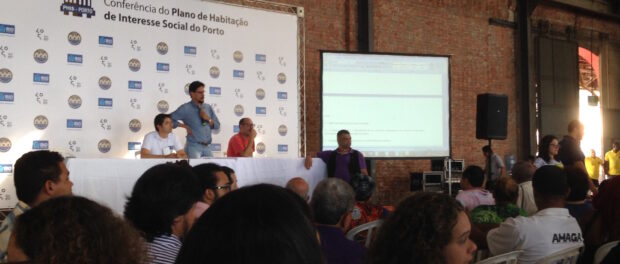
On August 14 and 15, 2015, nearly 300 people gathered in the Utopia Warehouse (Armazém da Utopia) along the coast of Guanabara Bay in the Port region of Rio for a long-awaited conference to discuss social housing provisions for residents in the region. The question of social housing in the Port region has become critical in the context of the heavy private investment in the Marvelous Port (Porto Maravilha) renewal projects in anticipation of the 2016 Olympics.
The conference was the culmination of three public audiences in June and July in which the City gave in to pressures from social movements to open up opportunities for broader participation by Port area inhabitants and social housing advocates. The first meeting focused on finding strategies to keep 30,000 residents from being pressured out of the region by increasing rent prices, the second meeting detailed strategies for incorporating mixed income development, and the final meeting addressed the specifics of social rent in the Port project. Social rent in Rio has only been used as a temporary measure, but during this meeting the possibility of social rent as a recurring cash transfer to low income residents was presented. Within the Brazilian context, ongoing social rent as a potential tool to address substantial housing needs has only been tried in São Paulo so far.
The conference’s main panel was chaired by the president of the Port Urban Development Company (CDURP) Alberto Gomes Silva, the Municipal Secretary of Housing Carlos Portinho, and Marcelo Edmundo, a member of the Center for Popular Movements (Central de Movimentos Populares, or CMP). On August 14, participants read and approved the bylaws that specified the participatory mechanisms and decision-making proceedings that would occur the following day. The Social Interest Housing Plan document prepared by CDURP incorporating learning from the three public audiences in June and July was presented.
On the next day, August 15, the conference structure produced groups centered around five themes, each analyzing the Plan: Social Housing, Areas of Special Social Interest (AEIS), Social Rent, Housing Improvements, and Community Equipment/Socio-productive Inclusion. Audience members split up amongst each group and reviewed the Plan line by line, suggesting specific amendments which were then voted on and finally considered in a plenary session. By the end of the conference, the group had crafted and voted to approve the final draft of the Social Interest Housing Plan.
For many participants the meeting was seen as an initial victory because it was a space for negotiation gained after years of struggle to protect the Port area inhabitants’ livelihoods in the context of urban revitalization and the resulting gentrification. One key amendment passed during this meeting was the increase from 5,000 to 10,000 social housing units to be built in the Port Area. And generally, participation from attendees on Saturday was active.
However, the most active participants were those organized in social movements and other entities. Some residents of Providência–Brazil’s first and most historic favela, located in the Port Zone–reported that many of them had been invited by CDURP with very short notice—just hours before the meeting—and individuals had been encouraged to find other residents to come with them, as if their participation had been an afterthought. As a result of the rush, one resident suggested, several people in attendance were not fully informed of the meeting’s background and purpose. Residents of favelas and other neighborhoods in the Port region who had come independently were noticeably less vocal than the academics and those who had come as part of social movements.
Skepticism among favela residents who had experienced or witnessed evictions was high, and some viewed the apparently participatory process as one more “performance” to distract people from real estate speculation. During a break one resident noted: “Revitalization for what? What is it that they want to revitalize? Aren’t there already people living here? Isn’t the Port area alive?”
There is still a long way to go before the drafted document becomes a tangible reality. While Secretary Portinho and Gomes Silva from CDURP celebrated the achievement of a “participatory direct democracy” in their opening speeches, it is important to note the recent history of private sector-dominated planning in the Port Area, whereby a coalition of private and public interests pushed for an agenda based on exceptionalism. In the context of land rights, exceptionalism means avoiding or neutralizing the constitutional rules in place to protect the social use of land. The active participation of academics at the conference—especially members of the Metropolis Observatory and lawyer and housing advocate Sonia Rabello—was crucial for mediating between residents and the complex governance mechanisms. These advocates also pressured authorities to stick to their promises of participation and social housing during the urban development processes that will continue to roll out over the next several years.
Following approval by the people present at the conference, the document will now be sent to the Managing Council of the Municipal Fund for Social-Interest Housing, which sets guidelines and approves the allocation of resources for public housing projects for the city. Several active participants in this conference, including the three panelists and Metropolis Observatory researcher and urban planner Orlando Santos Junior, are also members of the Managing Council, a promising sign for the passage of this document.
“When we organize, we can be stronger in our efforts,” said panelist Marcelo Edmundo, in a tone that was both optimistic and cautious. “Democratic processes are not easy.”
As the event came to an end, it was clear that attendees were somewhat hesitant to celebrate the successes of the meeting for fear that the changes would not be maintained or that the document would somehow be changed by the time it is approved. “Altering this plan after this meeting is undemocratic,” Orlando Santos Junior said emphatically, as many attendees in the crowd cheered their approval.


